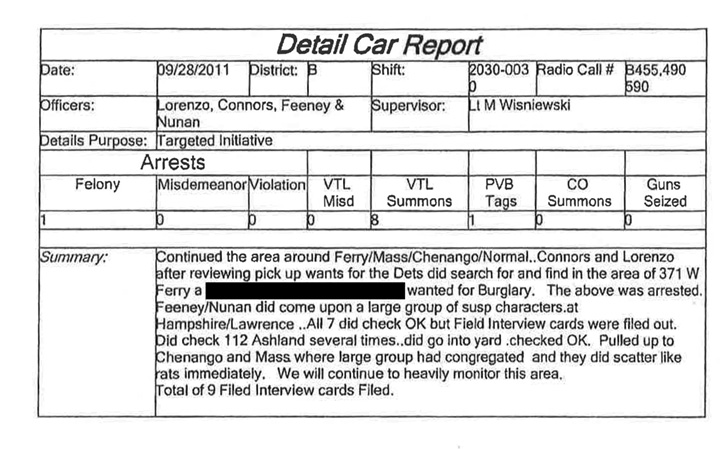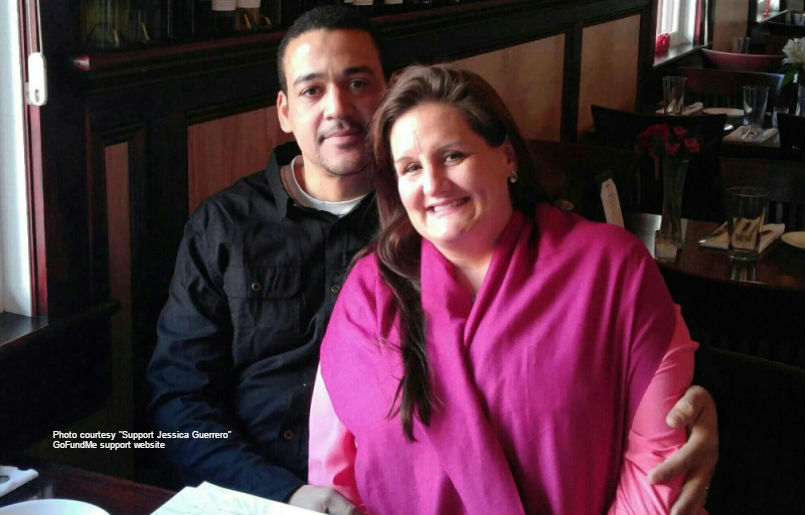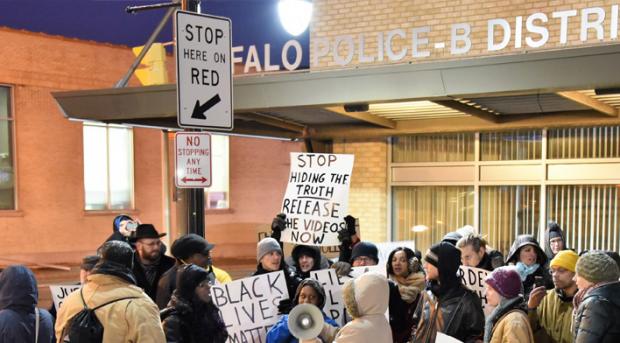The Public Record: Meech, Judges, and Deportations
“DID SCATTER LIKE RATS”
On the night Wardel “Meech” Davis died on a West Side street in handcuffs, the police who had stopped him were assigned to the B-District chief’s “detail car.”
What is a detail car? Based on what precious little can be found online and pieced together with the one report shared with The Public last week, a detail car is your neighborhood’s manifestation of the war on drugs. Instead of responding to 911 calls, the officers assigned to a detail car visit and re-visit areas of known drug activity. Also, a 2013 city press release says that detail cars in every district are expected to “perform ‘park and walk’ patrols on every shift.”
Pursuant to the Freedom of Information law in New York, The Public has sought access to the B-District’s detail car reports to gain greater insight into the practices of the city’s police force. The city has not responded to any The Public’s requests for information since Davis died.
But a B-District detail car shift report from 2011 has been shared with us. It reveals some of nature of that work and perhaps some of the viewpoint of the officers who perform it:

“Chenango and Mass” is a little more than a block from Hoyt and Arnold, where Davis died last month. “Hampshire/Lawrence” is exactly where Davis was effectively stopped and frisked last winter, according to prior reporting. You can use your imagination what “large group of susp characters” might mean, and what the process of “All 7 did check OK” actually looked like. Or how police who describe citizens as “rats” may interact with them.
Since his first campaign for mayor in 2005, Byron Brown has embraced a “broken windows” approach to policing similar to the the policies favored by former New York City mayor Rudy Giuliani. He’s called it “zero tolerance.” Based on the information we’ve cobbled together, the detail cars look like an extension of this practice, from the issuing of parking tickets to the aggressive targeting of suspected drug dealers. —AARON LOWINGER
JUDICIAL POLITICS
While the races for mayor of Buffalo and countywide offices may attract more political attention, there continues to be a lot of activity in upcoming judicial races. There will (at the moment) be two New York State Supreme Court seats on the ballot plus the Erie County Court seat being vacated by Judge Tim Franczyk and the Erie County Surrogate judgeship of retiring judge Barbara Howe.
A multitude of candidates are circling the political musical chairs.
Candidates for state Supreme Court include incumbent Justice Erin Peradotto, Erie County Court Judge Kenneth Case, Buffalo City Court Judge Amy Martoche, plus attorneys Steve Cohen, John DelMonte, and Gerald Greenan. Potential Erie County Court candidates include Buffalo City Court Judge Susan Eagan and Susan Maxwell Barnes. Acea Mosey has essentially been elected to Howe’s seat as surrogate judge, lining up party endorsements and facing no challenger. Her biggest challenge will be donating the hundreds of thousands of dollars she has raised for the campaign that will not be much of a campaign, and then later refunding unspent balances to her donors.
Case is considered by some as a favorite for one of the Republican nominations for state Supreme Court in September. Amy Martoche seems to have an edge for one of the Democratic nominations, given that the header on her March 15 fundraising invitation asks potential donors to “Join Erie County Democratic Committee Chairman Jeremy Zellner” for an evening with the candidate.
Here are a couple “word-on-the-street” items that are circulating. I don’t pretend to know if they are accurate or might occur. One such item says that Republican County Chairman Nick Langworthy is not really thrilled about endorsing Justice Peradotto; the bet would be that it will get worked out. The other rumor of note is that Surrogate Judge Barbara Howe might be interested in being appointed administrator in the Surrogate’s Office after she leaves elective office; in other words, Judge Howe and current Administrator Mosey would simply switch jobs. Doesn’t that seem unlikely?
Aside from the forgone race for surrogate judge, there will be several local judicial races that will be seriously contested in party primaries, the party nominating conventions in September, and the election in November. Off-year elections often favor the Republicans, who ignore elections in Buffalo to depress turnout there while attempting to run up their numbers in the suburban and rural areas. Maybe Trump’s toxicity will impact November turnout. Or could it be that a Schroeder-versus-Brown mayoral election will carry over until November and draw out Buffalo Democratic voters who might otherwise stay home? —KEN KRULY
Ken Kruly writes about politics and stuff at politicsandstuff.com.
ON PATH TO CITIZENSHIP, DETAINED BY ICE

Joel Guerrero, detained by ICE on March 1, and his wife, Jessica.
Joel Guerrero, a New Paltz esident arrested by Immigration and Customs Enforcement (ICE) at his biannual check-in with ICE on March 1, is being held at the Hudson County Correctional Facility in Kearney, New Jersey.
ICE arrested Guerrero at his appointment on the grounds that Joel had once missed a court date—in 2011. He was convicted of a misdemeanor charge of possession of marijuana at that time. Because of that conviction, under the rules for immigrants, Guerrero was mandated to check in with ICE two times a year, a rule with which he complied. Guerrero legally immigrated from the Dominican Republic two decades ago and has his green card. He has kept his papers up-to-date.
Guerrero has attended every court date since that missed one, but on March 2 ICE put a deportation order in effect for the single court appearance that he missed five years ago.
He was accompanied on his regularly scheduled appointment in New York City with ICE by his wife Jessica, a US citizen and New Paltz native who is six months pregnant with their first child.
In a report on social media, Jessica described the scene: “The ICE officer was literally ripping me from my husband’s arms. I really don’t know how I remained calm, but I turned to him and said, ‘You are breaking a family apart. I hope you are able to sleep well tonight.’ This is our country today. This is America.”
On March 2, Guerrero’s case officer put him in front of a judge without representation, and the judge ordered his deportation.
Guerrero should have had representation made available to him, and he should have been offered other options, such as filing a motion for spousal relief. It is reported that his case officer falsely told him that these options and several others were not available to him, even though they were.
Joel Guerrero is a carpenter, newly married with a pregnant wife, and is primary caregiver for his 15-year-old nephew, whose mother is too ill to take care of him. Over the last five years, his life has been opening up.
According to an article in a Hudson Valley web site, Jessica Guerrero has “retained an immigration attorney and has been trying to persuade the Immigration and Naturalization authorities to allow him to resume his life in his adopted homeland and not send him back to the Dominican Republic.”
For years, a felony conviction was deemed sufficient cause for ICE to order a deportation of an immigrant. A criminal defense attorney told me that ICE officers regularly (long before the new presidential administration took office) visited the local courts to review the names of those newly convicted: Those with surnames that look foreign were certain to receive visits from ICE officers.
On January 25, the US president signed an executive order titled, “Enhancing Public Safety in the Interior of the United States,” which expanded ICE’s definition of reasons for deportation: under previous administrations, ICE “prioritized those who had been convicted of serious crimes, were considered national security threats or were recent arrivals,” but the new executive order targets not only criminals “but also—among others—those who’ve been accused of crimes but not convicted, those who have engaged in document fraud, and those who ‘in the judgment of an immigration officer, otherwise pose a risk to public safety or national security.’”
Accused, not convicted. Thus, a misdemeanor conviction could be deemed sufficient cause for deportation of a man with a new family who has kept in active communication with ICE even with his troubles with the law in his past. The possession conviction did not merit a jail sentence, but it may result in Guerrero’s deportation five years later.
Guerrero has complied with all that has been requested of him on his route to full citizenship. He has not evaded bureaucratic entanglements, and he felt secure enough in his status and in his life to marry.
What lesson ought any immigrant who is not as secure in his or her citizenship status or paperwork as Joel Guerrero take from this arrest and detention?
Jessica Guerrero told local media last week that the best they can hope for is self-deportation: “If he voluntarily leaves, he won’t have the deportation on his record, and we would have more options in terms of countries where we would be able to actually go. [But] if this happens and he is deported, I will absolutely go with him. He is my husband. We are having a child together. This is my life. It’s not what I want but I couldn’t be apart from him.” —MARK ALDRICH
Mark Aldrich is a journalist based in Goshen who write about a multitude of subjects at thegadabouttown.com.

